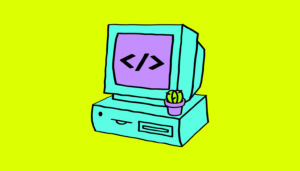There is much speculation on whether AI will replace software engineers in the future. Our data shows that organizations want to utilize AI and software engineers side-by-side. Companies are looking for developers well-versed in AI tools, which benefits the entire software development industry.
Let’s take a closer look at the outlook for software engineering in 2026 and beyond. We’ll also discuss how software developers can adapt to find work and how businesses can attract the best talent for their projects.
Key Trends
- AI is augmenting—not replacing—developers
- Engineers are shifting toward system design and strategic roles
- Routine coding tasks are increasingly automated
- New specializations in AI, quantum, and blockchain are emerging
- Soft skills and business acumen are more important than ever
How AI Is Transforming Engineering and Development
Modern engineers are beginning to shift from routine programming tasks to strategic thinking and architecture planning.
Here are some ways AI is changing the paradigm of traditional software development.
AI Is Augmenting Coders, Not Replacing Them
One of the biggest misconceptions about AI is that it will replace millions of developers. The truth is that companies are using AI to make engineers’ lives easier, not replace them.
For example, AI tools like GitHub Copilot are boosting developer productivity by:
- Auto-completing code snippets
- Reducing repetitive tasks
- Offering real-time suggestions based on context
GitHub’s CEO, Thomas Dohmke, states that AI will make engineers faster and won’t replace them. He also says that AI will lead to businesses hiring more developers to manage AI workflows.
With Copilot, engineers can generate boilerplate code, test cases, and build entire functions with just a few prompts.
Additionally, Visual Studio Code (VS Code) utilizes features like IntelliSense to assist engineers in writing clean code in minutes. Developers can even integrate Copilot into VS Code to benefit from an AI-assisted workflow within any environment.
Plus, the available statistics show one thing: Software engineers are going nowhere post-2025.
According to reports by the U.S. Bureau of Labor Statistics, the demand for IT talent, especially in fields shaping the future of software engineering, will grow exponentially (about 17% over a ten-year period ending in 2033).
From Writing Code to Designing Systems
Microsoft CTO Kevin Scott recently said that “95% of code will be AI-generated,” but clarified that humans will still lead authorship and design.
With AI eventually taking on repetitive coding tasks, engineers can instead focus on major responsibilities like modular design, orchestration, and system architecture.
Businesses benefit from having their developers focus on:
- Planning how entire systems will work together
- Manage cloud infrastructures
- Automate deployments
- Software project management
- Structure applications into scalable, reusable components
These higher-level tasks are beyond the capabilities of modern AI. They require deep human understanding of business goals, technical ecosystems, and long-term maintainability.
Routine Tasks Are Being Automated
Modern AI is being delegated to handle low and high-priority routine tasks, freeing up engineers to focus on parts of their jobs that require human thought.
Here are some unique use cases of routine tasks developers are delegating to AI workflows:
- Bug fixing: Tools like Sourcegraph’s Cody and GitHub Copilot can now fix bugs in real-time. These tools can make repairs based on both syntax and context.
- Code refactoring: Refactoring large codebases used to be extremely tedious and time-consuming. Linting tools can now rewrite entire blocks in a different style or restructure with minimal risk.
- Documentation generation: Modern AI tools make software development incredibly agile. Tools like Mintlify and ChatGPT can generate usage examples, end-user documentation, and method summaries en masse.
- Test writing: Engineers can rely on AI tools to scaffold out unit or integration tests by analyzing the functions of their program. For example, developers can roll out Jest and Mocha boilerplate within seconds.
- Boilerplate code: If a developer needs a CRUD API scaffold for a new feature, they can use AI to write Express or Django routes, serializers, and models within minutes.
Developers Are Wondering If the Career Is Still Worth It (With AI)
Despite AI’s benefits, many developers are still uncertain or anxious about their futures. According to our recent AI-Assisted Coded report, 66% of developers worry about AI replacing humans.
According to Microsoft CEO Satya Nadella, “I’d say maybe 20%, 30% of the code that is inside of our repos today and some of our projects are probably all written by software.”
When Nadella asked Meta CEO Mark Zuckerberg how much of Meta’s code was coming from AI, Zuckerberg stated:
“Our bet is sort of that in the next year, probably … maybe half the development is going to be done by AI, as opposed to people, and then that will just kind of increase from there.”
Both companies employ tens of thousands of software developers, so mass unemployment seems highly unlikely.
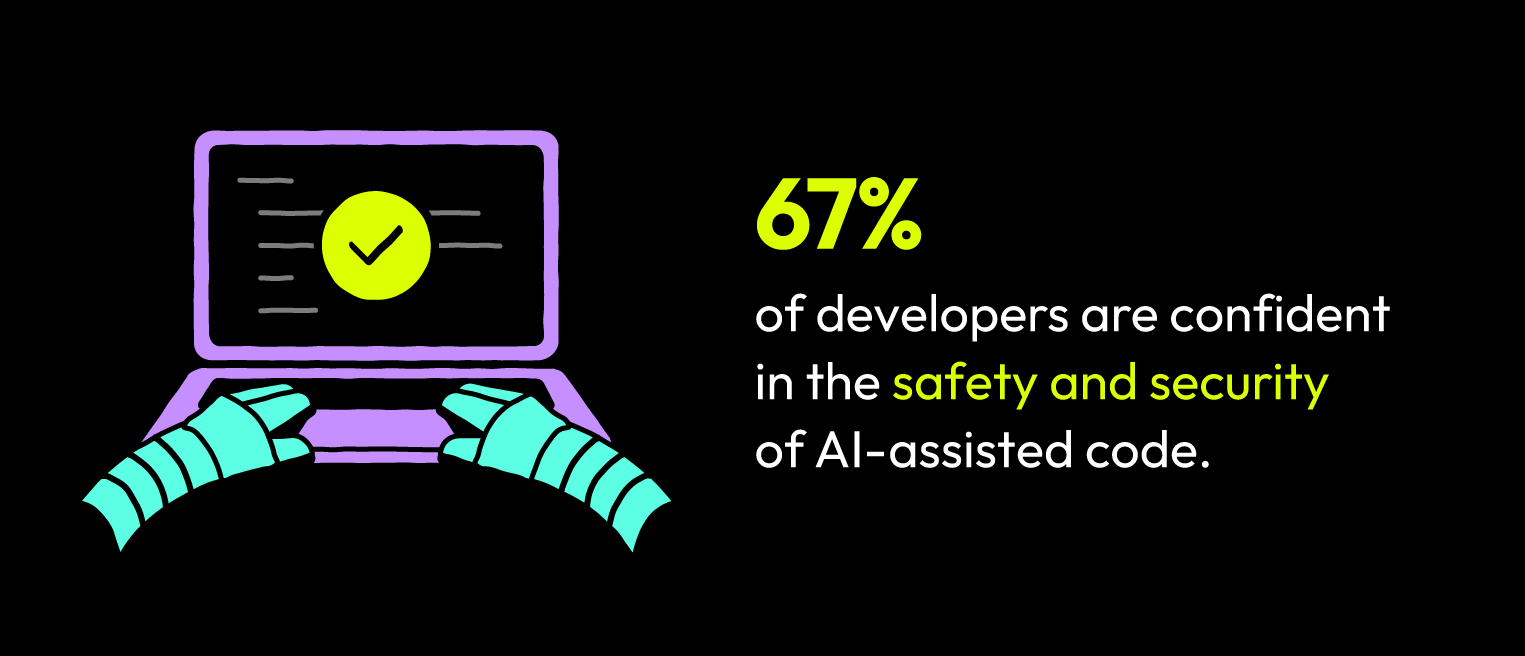
Important Industry Trends Shaping the Future
Several new advancements will take place in the future of software engineering.
Since engineers will be increasingly reliant on AI to streamline routine tasks, developers will likely focus on:
- Establishing low/no-code environments
- Collaborating with global, asynchronous (async) teams
- Shifting closer to cloud computing and cybersecurity
Let’s go over these key industry trends.
Digital Transformation
Contrary to massive public opinion, as businesses increasingly rely on software and digital technologies, the demand for software engineers will continue to rise.
For example, here are some notable reasons companies will look to hire more engineers to assist with digital transformation initiatives:
- Enterprises often replace ancient monolithic systems with modern, cloud-based microservices. This migration involves re-architecting core business logic, like order processing or customer portals, which requires skilled engineers.
- The Global Digital Transformation Market size is projected to reach 4,617.78 billion (USD) by 2030.
- Manufacturers are integrating smart sensors into their products, such as consumer wearables and industrial equipment. They need engineers to build the backend systems that acquire, process, and visualize this data.
- eCommerce platforms rely on AI-powered recommendation engines that process and analyze data in real-time. Engineers can help by designing scalable APIs and integrated machine learning (ML) models.
- Large organizations heavily use AI to automate internal workflows like compliance checks and employee onboarding. Engineers can build integrations between these AI platforms and other tools.
Shift to Cloud Computing
Developers who are worried or optimistic about their job prospects should pursue building their expertise in cloud computing.
After all, the cloud computing market could grow to over $2 trillion by 2032. Cloud computing has become the basic standard for operating a modern business, and human engineers are necessary to assist.
Here are some essential skill sets for developers in cloud computing, and some use cases for businesses needing talent:
Use cases for businesses:
- Automated deployments and CI/CD pipelines: Companies can hire engineers to configure and own end-to-end deployment pipelines using tools like Jenkins, GitHub actions, and Terraform. This allows them to easily integrate testing, code reviews, security checks, and rollbacks.
- Service orchestration: With cloud-native architecture, managing microservices and containers like Kubernetes, Docker, Swarm, or serverless platforms (e.g., AWS Lambda) is a must. Developers can design health checks, load balancing, auto scaling policies, and failover strategies to create strong and elastic systems.
- Scalability engineering: As cloud computing continues to phase out traditional systems, companies will need to invest heavily in hiring engineers who can help them leverage multi-region deployments, distributed databases, and scaling groups.
Required skill sets for developers:
- Engineers won’t just be writing code anymore. They will help configure how applications live and grow in production.
- Software engineers will set up monitoring (e.g., via Prometheus, Datadog), CI/CD automation, and infrastructure-as-code. These will become normal code-centric engineering tasks.
- Your code must be cloud-aware, not just functional. Understanding service topology and traffic patterns will become essential for engineers.
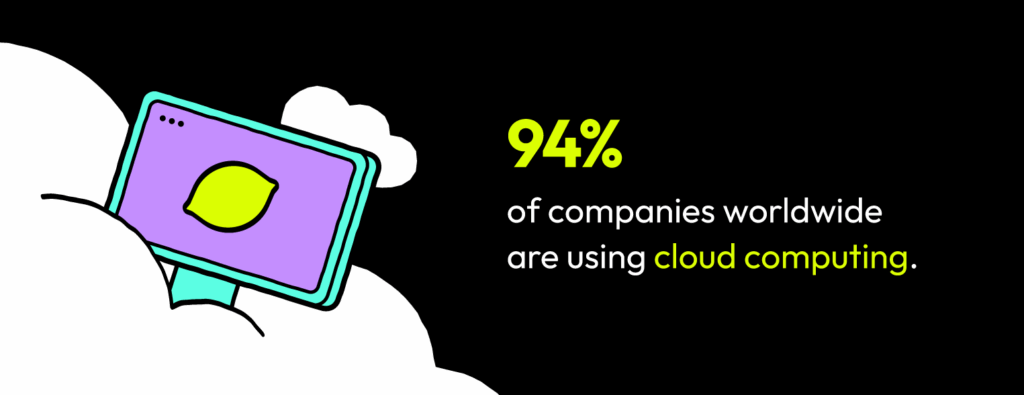
Cybersecurity Gains More Traction
Cyberattacks are on the rise across the board, with Amazon receiving nearly 1 billion daily cyberthreats.
Because of the rise of global cyberattacks, TechRadar reported a 12% annual growth rate in cybersecurity roles. This growth was specific to ethical hacking, AI threat intelligence, and cloud security.
Because of the massive value cybersecurity engineers bring, they’re one of the highest-paid professionals on the market.
Here is the landscape of each field for both engineers and organizations:
- Cloud Security Engineers: These professionals build cloud architectures, enforce identity and access management (IAM), set up encryption protocols, and audit cloud infrastructures. Their jobs are pivotal for ensuring microservices or serverless apps remain locked down even at scale.
- AI & Threat Intelligence Engineers: These developers design systems that feed threat detection into ML models. They automate anomaly detection pipelines, analyze logs at scale, and proactively guard against evolving AI-powered attacks in real-time.
- Ethical Hackers & Pen Testers: On the offensive side, these professionals simulate attacks to uncover vulnerabilities. They write exploit scripts, test APIs for injection flaws, and harden systems before attackers get a chance to strike.
Open Source and Low/No-Code
According to a recent report from Hostinger, low-code platforms will power 75% of new applications by 2026. Let’s get straight into why this even matters for developers and organizations.
To begin, engineers can evaluate and integrate best-of-breed, open-source, and low-code tools like NocoBase for backend workflows, data models, and authentication.
Next, developers can define how business logic maps onto modules, ensure security (IAM, encryption, etc), and design APIs that plug into existing systems.
Finally, engineers can coach citizen developers on best practices for version control, data privacy, and test-driven artificial intelligence software development.
As a result, low/no-code platforms stand to empower developers right now. However, how does this technology benefit organizations?
To start, low-code infrastructures accelerate delivery and efficiency. Without technical oversight, this can lead to fragmentation, security gaps, and performance issues.
Companies can also utilize developers to build modular and maintainable systems. Engineers can help businesses deploy low-code systems faster, without sacrificing quality.
This all means that non-technical teams gain velocity in deployment, while core development teams focus on resilience, optimization, and architecture.
Remote Work and Global Collaboration
Distributed teams span time zones, cultures, and continents, requiring companies to rethink how they build software and manage collaboration.
Through remote work, companies can rely on offshore and nearshore support to find affordable labor as their needs fluctuate.
Here’s what embracing remote work and async culture means for both developers and teams:
- Async by design: Daily standups become Loom videos. Feedback and pull requests are handled via clear GitHub comments. Collaborators from around the world can work together without delays.
- Tooling that supports autonomy: Modern remote teams rely on automated CI/CD and shared development environments to reduce their dependency on real-time availability.
- Offshore hiring: Businesses are actively hiring from global talent pools to access senior software engineers at scale, save on costs, and increase time-zone coverage.
- Nearshore hiring: Nearshore partnerships (like Lemon.io’s developer network) allow for smoother integration with Western teams while maintaining agility.
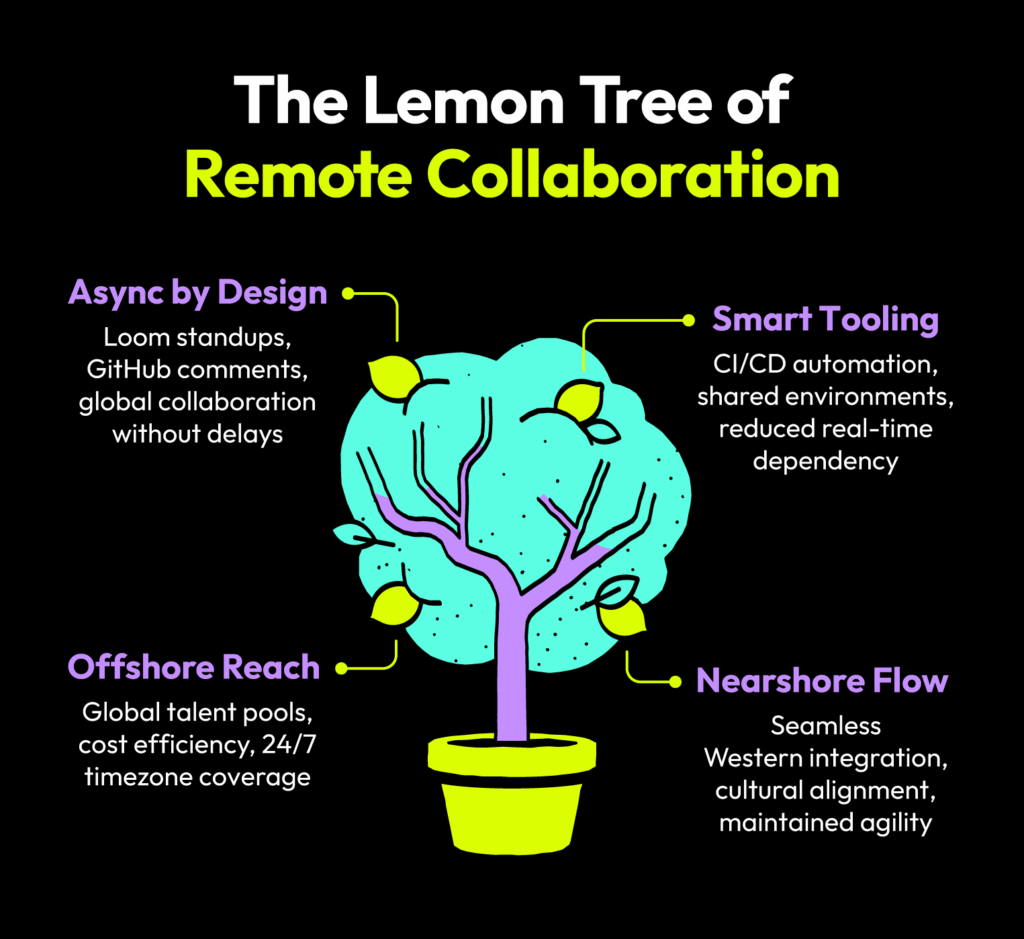
How Engineers Can Future-Proof Their Careers
The future of software development isn’t just about knowing the latest frameworks. It’s about evolving with the role itself.
AI will continue to automate routine tasks, and digital transformation will reshape what companies expect from developers.
As a result, developers must focus on the skills AI can’t replicate: strategic thinking, leadership, and communication. Future-proofing your engineering career means becoming a decision-maker and collaborator.
Whether you’re a junior developer or a senior architect, here are some practical ways to stay relevant and in demand:
- Embrace change and stay adaptable: Learn how to adopt new tools, AI copilots, and platforms quickly. Join hackathons, explore open-source projects. Don’t be afraid to dive into emerging fields like edge computing, WebAssembly, and real-time collaboration stacks.
- Prioritize strategic thinking: Go beyond tickets to understand why a feature exists, how it aligns with business goals, and what trade-offs were made. Ask questions during sprint planning and contribute ideas in retros. This mindset shifts you from “task executor” to “technical partner”.
- Invest in communication and cross-team collaboration: Engineers who can explain complex systems to product managers, designers, and non-technical founders are invaluable. To build interpersonal soft skills, try rubber duck debugging with coworkers, write clean documentation, and lead sprint demos.
- Develop leadership skills: Take initiative by mentoring juniors, owning cross-functional teams, or helping implement better team workflows. Leadership in AI engineering is all about influence and reliability.
- Create profiles on developer marketplaces: Platforms like Lemon.io help you build a portfolio, connected with vetted opportunities, and showcase your niche strengths and certificates (e.g., AI dev, DevOps, QA automation). Being discoverable outside your current job opens up freelance, startup, and remote roles.
How Businesses Can Prepare for the Future
Nowadays, businesses must be proactive when building and maintaining technical teams.
Preparing for the future of software engineering means aligning your hiring, tooling, and culture with what today’s engineers actually need to thrive.
Here are five actionable ways companies can stay ahead of AI software development:
- Audit current engineering capabilities: Assess your team’s skills, tooling, and architecture. Are they prepared to adopt AI tooling? Can they manage cloud-native infrastructure? A skills gap analysis can help identify where investment is necessary, whether in upskilling or new hires.
- Prioritize strategic & cross-functional thinkers: Technical proficiency is critical. However, developers who understand product strategy, user experience, and long-term scaling challenges bring far more value. Tailor job descriptions and interviews to surface these traits, not just code output.
- Build an async-ready culture: Whether fully remote or hybrid, async workflows are essential for productivity across time zones. Invest in documentation tools, shared dashboards, and communication practices that don’t depend on real-time meetings.
- Invest in cybersecurity & cloud resilience: Cloud-native and AI-assisted systems introduce new vulnerabilities. Ensure your team includes engineers who can bake security into every stage of the software development lifecycle (SDLC).
- Source senior engineers from vetted developer marketplaces: Platforms like Lemon.io offer access to rigorously vetted senior developers across specialties like AI, DevOps, security, and more. This allows companies to scale quickly without compromising on quality or fit.
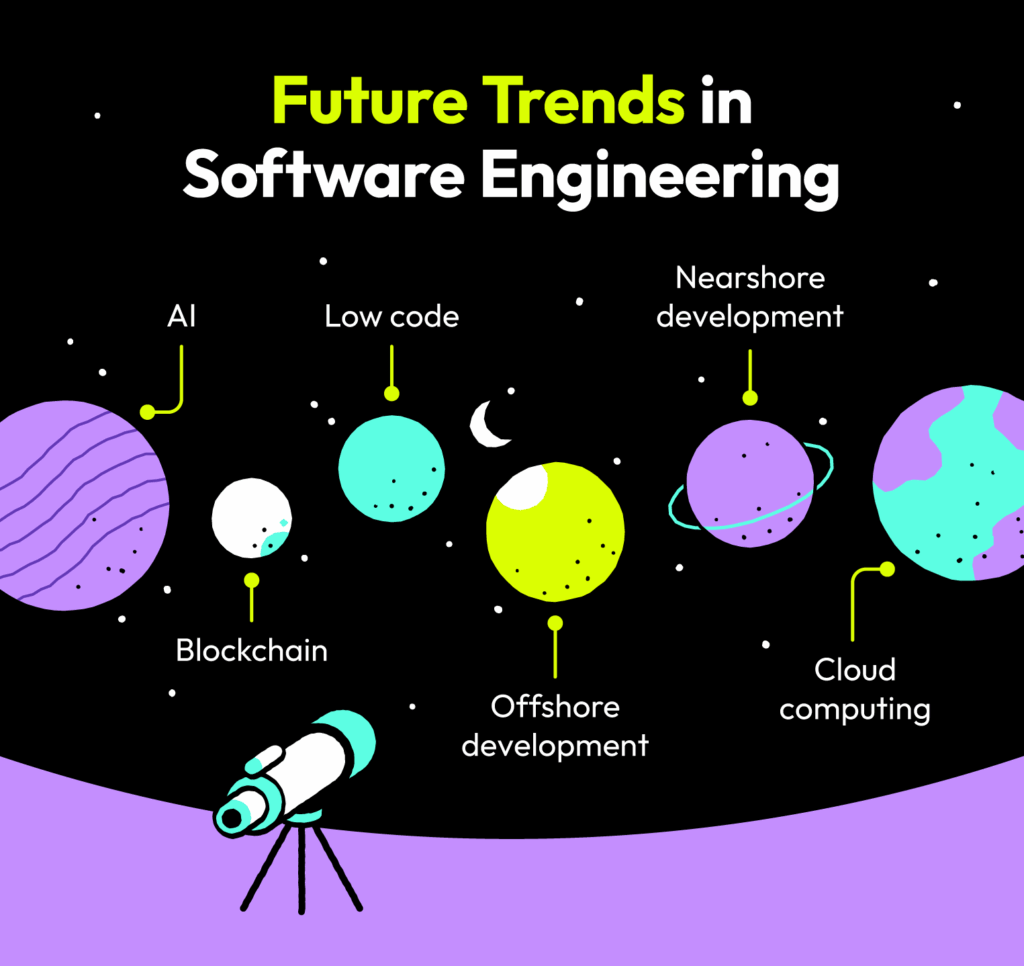
The Best Software Engineers are on Lemon.io
As AI continues reshaping software development, it’s clear engineers aren’t going anywhere. However, their roles are evolving fast. The future belongs to developers who can adapt to new tools, think strategically, and collaborate across functions and borders.
Ready to future-proof your team? Hire top-tier developers through Lemon.io and build what’s next.
FAQ
Does software engineering have a future?
Software engineering absolutely has a future. The demand for software engineers will only grow as the world leans more toward AI to power everyday tasks. However, their role will shift more to architecture, strategy, and system design.
Will AI replace software engineers in 2025?
No, AI won’t replace software engineers, but it will change how they work. AI is automating repetitive coding tasks, but human engineers are still essential for designing systems, making strategic decisions, and solving complex problems.
Will software engineers be needed in 2050?
Yes, software engineers will be needed in 2050. More than ever, engineers will be necessary for building ethical, scalable, and technical systems that AI alone can’t manage or conceptualize.



